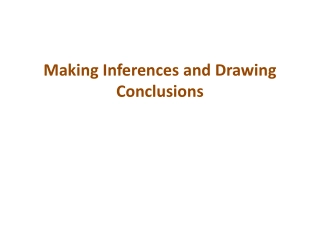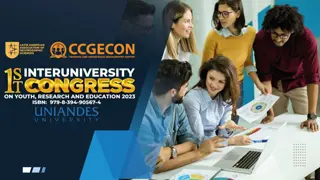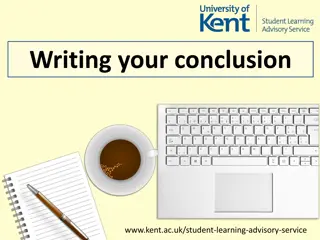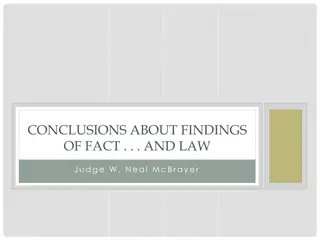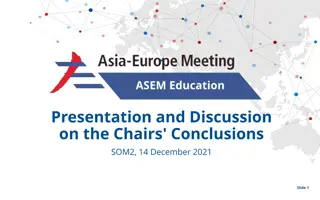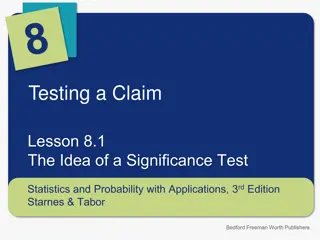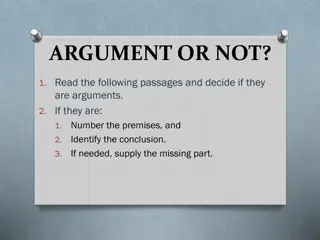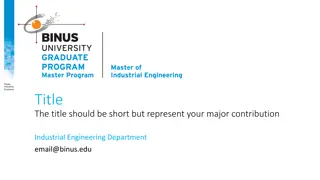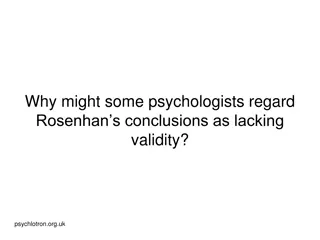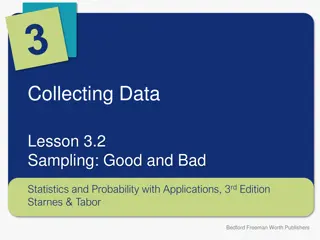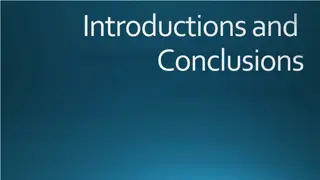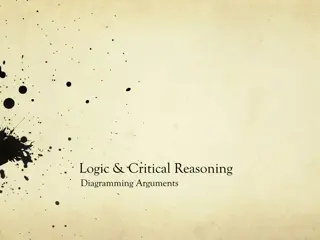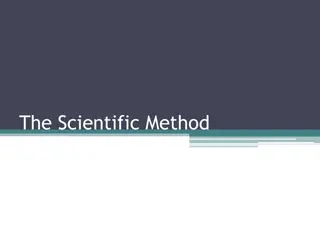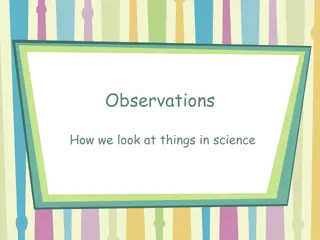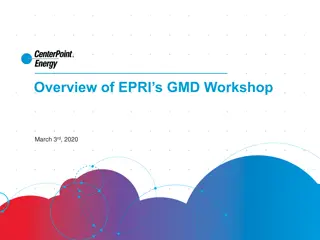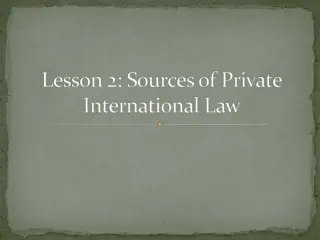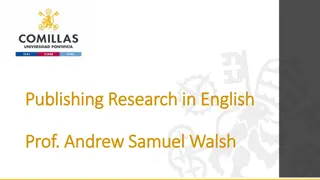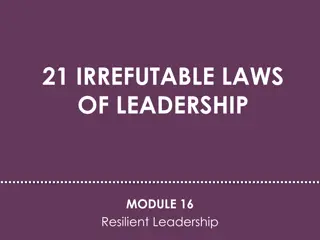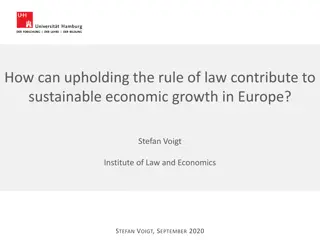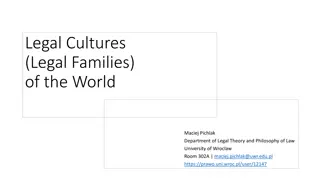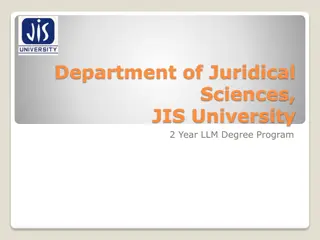Making Inferences and Drawing Conclusions
Readers construct meaning by inferring unstated meanings based on social conventions, shared experience, and shared values. Inferences are evidence-based guesses drawn from what is actually said, enabling readers to understand implications and draw conclusions. Tips for reading include relying on th
0 views • 10 slides
Understanding Inductive and Deductive Reasoning
Inductive reasoning involves drawing general conclusions from specific observations, while deductive reasoning starts with general premises to derive specific conclusions. Induction uses experience or experimental evidence to make broad conclusions, while deduction follows from general to specific.
5 views • 7 slides
Konw about our team
Know About Our Team:\nMr.Bageerathan\nMr. Bageerathan is a distinguished legal professional with a rich background spanning over 16 years in the legal field. He earned his Law degree from University Law College and further enhanced his legal acumen by obtaining Dual Masters degrees in Law (LL.M) fro
0 views • 4 slides
Research Findings and Conclusions on Methodology Implementation
This presentation outlines the importance and objectives of the research, detailing the methodology used and presenting the obtained results. Conclusions are drawn, emphasizing key findings and encouraging further exploration of the topic.
0 views • 9 slides
Structuring Your Essay Conclusion Effectively
Understand the importance of essay conclusions, learn how to structure a conclusion, identify key elements of a good conclusion, reiterate the question, summarize main points, present conclusions or hypotheses, and ensure the question is answered with supporting evidence.
0 views • 12 slides
Crafting Strong Conclusions: A Guide for Effective Endings
Conclusions in academic writing serve to wrap up discussions, restate key points without repetition, and possibly suggest future research directions or call to action. It is crucial to avoid introducing new information in the conclusion and aim for clarity and conciseness. This guide provides insigh
0 views • 6 slides
Understanding the Distinction Between Findings of Fact and Conclusions of Law
The distinction between findings of fact and conclusions of law is explored through various legal opinions and cases. The complexity and importance of this distinction are highlighted, with instances where findings are deemed as conclusions and vice versa. Scholars and legal experts have pondered ov
0 views • 24 slides
Austin's Theory of Law by Rinkey Sharma: An Overview
Austin's Theory of Law, presented by Rinkey Sharma, delves into the Imperative Theory of Law as proposed by Austin, known as the father of English jurisprudence. It explores General and Particular Jurisprudence, Austin's definition of law, and the elements of positive law, emphasizing the concepts o
0 views • 11 slides
Presentation and Discussion on Chairs' Conclusions - SOM2, 14 December 2021
Presentation and discussion on the Chairs' conclusions from ASEMME8, covering topics such as Strategy 2030, commitment to AEP, projects undertaken between ASEMME7 and ASEMME8, and more. The Chairs expressed gratitude to host countries and stakeholders involved in implementing initiatives and project
0 views • 15 slides
Understanding Significance Testing in Statistics
Significance testing is a vital concept in statistics used to analyze data and make informed conclusions about population parameters. This lesson delves into the significance test procedure, hypotheses formulation, interpreting P-values, and drawing appropriate conclusions based on statistical evide
1 views • 9 slides
Understanding Gas Laws: Boyle's, Charles', Gay-Lussac's, and Avogadro's Laws
Gas laws such as Boyle's Law, Charles' Law, Gay-Lussac's Law, and Avogadro's Law govern the behavior of gases under different conditions. Boyle's Law relates pressure and volume at constant temperature, Charles' Law relates volume and temperature at constant pressure, Gay-Lussac's Law relates pressu
1 views • 19 slides
Analyzing Arguments in Various Contexts
The provided content involves analyzing whether certain passages present arguments or not. It includes examples where premises lead to conclusions, such as the benefits of exercise and the moral implications of executive pay discrepancies. Each passage is evaluated to determine the existence of logi
0 views • 35 slides
Proposal and Thesis Presentation Template for Industrial Engineering Department
These slides serve as a comprehensive template for proposal and thesis presentations in the Industrial Engineering Department. They guide students on structuring their research, from background to conclusions, assisting them in showcasing their work effectively. The template emphasizes the importanc
0 views • 11 slides
Evolution of Trust Law in Malta
Malta, with a unique legal system integrating civil and common law concepts, has evolved its trust law over the years. The concept of trust was gradually adopted, culminating in full integration into domestic law post-2004. Recent amendments have further solidified the legal framework, bridging the
4 views • 150 slides
Mastering the Art of Persuasive Speech
Crafting a persuasive speech involves captivating introductions, compelling content, and impactful conclusions. Learn the essential elements: attracting attention, establishing credibility, motivating action, and more. Explore methods for developing engaging introductions and powerful conclusions. D
3 views • 31 slides
Evaluating the Validity of Rosenhan's Conclusions in Psychology
Some psychologists question the validity of Rosenhan's conclusions due to methodological flaws in his study, such as lack of generalizability and potential biases. Critics argue that the findings may not accurately reflect real-world psychiatric settings, leading to skepticism about their applicabil
0 views • 250 slides
Understanding the Rule of Law and Legal Systems in Wales and England
The content discusses the nature of law, the Welsh and English legal systems, and the Rule of Law doctrine. It includes observations from the 2019 AS Law Unit 1 examination, emphasizing the importance of adhering to rubrics and answering questions clearly. Candidates faced challenges with timing and
0 views • 14 slides
Contrasting Legal Systems Around the World
Explore the diverse legal families globally, such as Civil Law (Romano-Germanic) and Common Law (Anglo-American), along with their historical backgrounds, sources of law, and dominant ideologies. Delve into the distinctions between Civil Law and Common Law, their origins, development, and practical
0 views • 17 slides
Understanding General Criminal Law: Principles and Relationships
General Criminal Law encompasses rules governing offenses and their penalties, exploring the definitions of offenses, relationships with social sciences, other branches of law, and auxiliary sciences. This presentation covers the importance, sources, and branches of criminal law, highlighting its in
1 views • 230 slides
Understanding Biases in Sampling Methods
Statistical studies rely on samples to draw conclusions about populations, but the method of sampling can introduce biases. This text discusses convenience sampling, voluntary response sampling, random sampling, and the implications of biased sampling methods on study results. It highlights how bias
1 views • 12 slides
Mastering Introductions and Conclusions for Engaging Presentations
Learn the essential elements of crafting powerful introductions and conclusions for your presentations. Explore strategies to captivate your audience, establish credibility, and leave a lasting impact. Discover techniques such as using rhetorical questions, impactful quotations, and startling facts
0 views • 38 slides
Exploring Argument Structure and Diagramming in Critical Reasoning
Understanding the two types of argument structures - atomic and complex, with examples and diagrams. Learn how argument diagrams visually represent the structure of an argument, identify significant units like premises and conclusions, and distinguish main conclusions from sub-conclusions. Dive into
1 views • 10 slides
Task 4.3 Meeting Conclusions and Next Steps
The Task 4.3 meeting held on Dec 16-17, 2019, discussed key conclusions and outlined next steps for the ESCAPE project funded by the European Union. The meeting covered topics such as tech forums, hackathons, platform capabilities, imaging plans, progress reports, and future demos. Spectra analysis,
0 views • 4 slides
Chile Country Portfolio Evaluation 2010-2014 Summary
Evaluation process of Chile's country portfolio from 2010-2014 included pre-evaluation, during evaluation, and results/conclusions phases. Challenges like defining scope and participant concerns were addressed. Preliminary conclusions were presented to stakeholders, leading to a trustful and represe
1 views • 6 slides
Understanding the Scientific Method and Examples
The scientific method is a systematic approach to answering questions and solving problems. It involves steps like observation, asking questions, forming hypotheses, collecting data, organizing data, and drawing conclusions. This method helps researchers find answers efficiently and allows others to
0 views • 9 slides
Understanding Combined Gas Law and Ideal Gas Law for Final Exam Preparation
Explore the concepts of Combined Gas Law, Boyle's Law, Charles's Law, Gay-Lussac's Law, and their reflection in the Ideal Gas Law. Learn how to solve problems using these laws, prepare for your final exam scheduled for Tuesday, December 12 at 12:30 in the specified room. Dive into in-class practice
0 views • 23 slides
Overview of UK Law: Statute Law, Common Law, Criminal Law, Civil Law
Statute Law is written law created through the parliamentary process, forming the basis of the legal system. Common Law, on the other hand, is unwritten law based on judicial decisions and precedents. They govern different aspects such as civil and criminal matters, each with its unique characterist
0 views • 15 slides
Understanding Observations in Science
Observations in science are essential for gathering data and drawing conclusions. This includes making qualitative and quantitative observations, using senses and tools to increase accuracy, and distinguishing facts from opinions. Inferences are conclusions drawn based on observations and data. Prac
0 views • 13 slides
EPRI's GMD Research Updates and Preliminary Conclusions
EPRIs GMD workshop presented updates on research projects focusing on the impacts of geomagnetic disturbances (GMD) on the bulk power system. The workshop highlighted ongoing and upcoming projects, including assessments of transformer thermal impacts, GIC estimation models, geoelectric field enhance
0 views • 16 slides
International Law Programs 2021: E-Castle Updates and Course Offerings
Explore the online programs offered by the International Law Programs in 2021 at the E-Castle. Discover the benefits, courses available, program dates, instructor insights, and more. From International Business Law to Public International Law, gain valuable knowledge and networking opportunities in
0 views • 21 slides
Mastering Introductions and Conclusions for Effective Writing
Explore the art of crafting engaging introductions and impactful conclusions with insights shared by experts. Dive into understanding their structure, crucial components, and how to modify or create them effectively. Engage in hands-on activities to enhance your skills in building compelling opening
0 views • 22 slides
The Continuing Relevance of English Law to Irish Corporate Law Reform
English Law remains relevant in Irish corporate law reform, impacting areas like takeover regulation, deferred prosecution agreements, schemes of arrangement, and the comply or explain approach. The influence of English law is seen where there is no EU law dimension or when EU legislation allows mem
0 views • 10 slides
Understanding Private International Law: Key Principles and Treaty Regimes
This lesson delves into the sources, key principles, and treaty regimes of private international law. It covers jurisdictional competence, conflicts of law, recognition of foreign judgments, Canadian common law vs. Quebec civil law, Hague Conventions, and the United Nations Convention on Contracts f
1 views • 14 slides
Mastering Conclusions in English Publishing Research
Conclusions in English publishing research play a crucial role in offering a final insight, emphasizing the significance of your paper, drawing conclusions from results, and potentially leading to broader discussions. Avoid repeating content, focus on coherence, echo your introduction, and pose thou
0 views • 14 slides
Classification of Law: Understanding Different Types and Functions
Exploring the classification of law is essential for understanding the diverse nature of legal systems. This overview delves into domestic law vs. public international law, public law vs. private law, and the sub-divisions within public law, such as constitutional, administrative, and criminal law.
0 views • 19 slides
Laws of Leadership: Resilient Leadership Module
Explore the 21 Irrefutable Laws of Leadership Module on Resilient Leadership, covering essential principles such as the Law of the Lid, Law of Influence, Law of Process, Law of Navigation, Law of Addition, and Law of Solid Ground. Navigate through phases of leadership growth, learn to add value, bui
0 views • 37 slides
Overview of Legal Systems and Roman Law Development
Legal systems play a crucial role in governing societies, with Roman Law, Common Law, Civil Law, and Religious Law being some of the major types worldwide. Roman Law, focusing on private law, has influenced legal traditions in various regions, especially in Europe. Contrasting Common Law and Civil L
0 views • 26 slides
Upholding the Rule of Law for Sustainable Economic Growth in Europe
Democracy and the rule of law are essential for sustained economic growth in Europe. The rule of law ensures stable and impartial enforcement of rules such as property rights and contract law, key for market economies. Upholding the rule of law is crucial for combating corruption and maintaining a f
0 views • 6 slides
Comparative Analysis of Legal Families Around the World
Explore the diverse legal cultures and families existing globally, including Civil Law, Common Law, Far East, Islamic, Hindu, and more. Learn about the historical background, methods of reasoning, institutions, sources of law, and dominant ideologies that characterize each legal family. Delve into t
0 views • 17 slides
2-Year LLM Degree Program in Juridical Sciences at JIS University
Explore the 2-year LLM degree program offered by the Department of Juridical Sciences at JIS University, specializing in Corporate Law, Criminal Law, and Constitutional Law. The program covers a range of specializations such as Comparative Criminal Law, Human Rights, Corporate Law, Competition Law,
0 views • 7 slides
